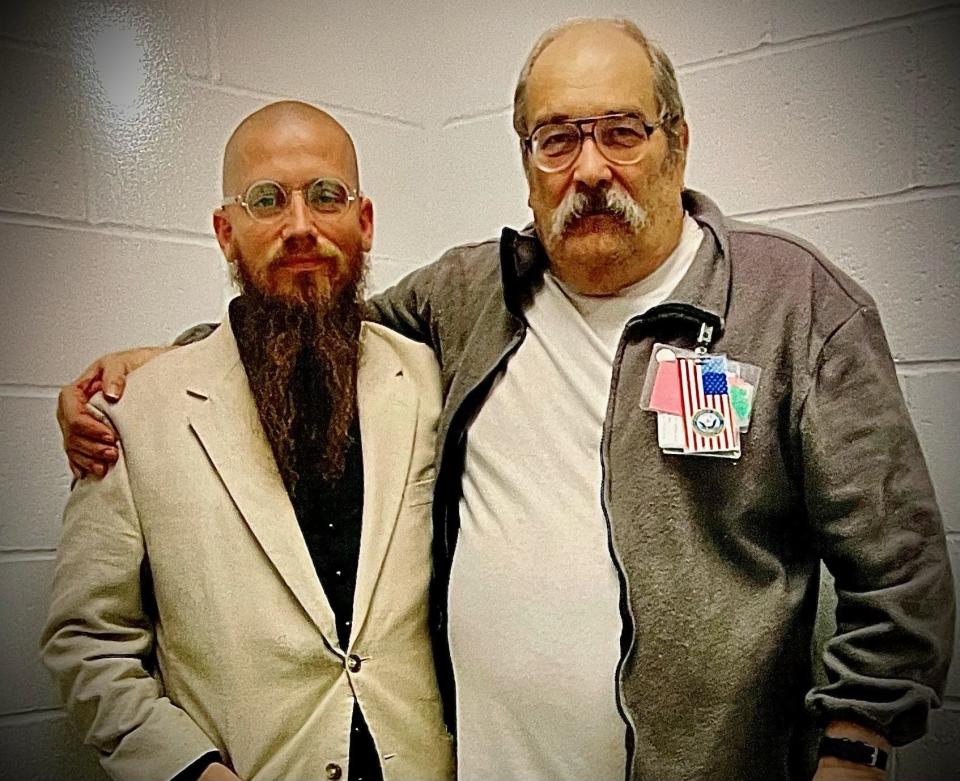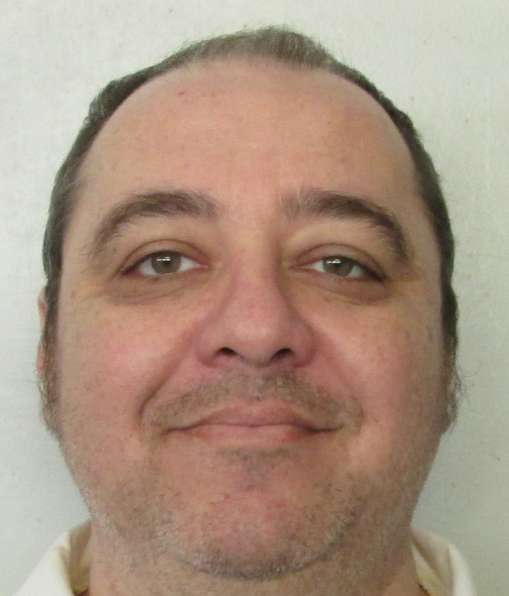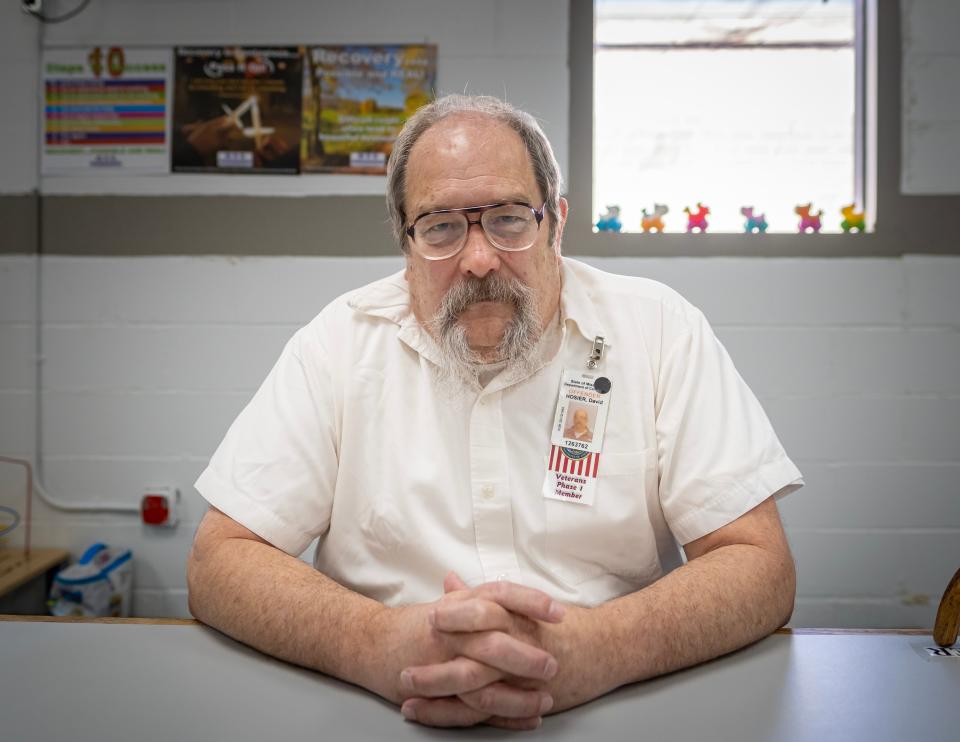Comforting the condemned: Inside the execution chamber with reverend focused on humanity

When the Rev. Jeff Hood entered Missouri's execution chamber this past week, he saw something hauntingly out of the ordinary: himself.
The window to the death chamber is one-way, meaning witnesses can see inmates but inmates cannot see who is watching them, Hood told USA TODAY, adding that every other execution he's witnessed in other states has been in a room with a two-way window.
"It's like a house of horrors," Hood said. "It's very, very bizarre."
Hood walked in to find his friend, David Hosier − a man condemned to die for the 2009 murder of a former lover − strapped to the gurney. Hosier's final words to the reverend before Missouri executed him: "Give 'em hell, Jeff." Encouragement for Hood to keep fighting against the ultimate punishment.
As Hood put his hand on Hosier's shoulder and began to read scripture, the intravenous line to deliver the lethal injection was near Hood's elbow. Soon the reverend was able to see the pentobarbital − or as he calls it, "poison" − travel to end Hosier's life.
When time of death was pronounced at 6:11 p.m. on Tuesday, Hosier became the seventh man Hood has seen executed.
Hood says witnessing executions makes him feel 'like a murderer'
In 2022, the Supreme Court ruled that spiritual advisers must be allowed into execution chambers if death row inmates want them. Since then, the 40-year-old Hood − who lives in Little Rock, Arkansas with his wife and five children − has made it one of his missions to comfort the condemned in their final weeks, hours and minutes.
"My job is to come into their lives when they have six to three months left to live and become their best friend," Hood told USA TODAY in an interview shortly after Hosier's execution. "I become their best friend in order to be their best friend when they die."
After seven executions, Hood said it doesn't get any easier. If anything, it's gotten harder.
"You feel like a murderer," he said. "I'm called to be there for my guy. I'm called to pray. I'm called to read scripture. For all of my good intentions, I ultimately do nothing to stop it ... I sit there and watch someone I love be murdered. In my inaction, I join the team of murderers.
"Being a part of the entire process is moral torture," he added.
But Hood feels compelled to continue the work. Three inmates have asked him to accompany them to their executions in the next six months, and he works with about two dozen others throughout the country. This despite what he says have been numerous death threats against him and his family.
Why?
"Giving someone a voice, that's the only thing that can make them feel like a human being," he said.

Hood witnessed world's first nitrogen gas execution
While Hood says every execution he's witnessed is disturbing, he's particularly haunted by that of Kenneth Eugene Smith, who was put to death by nitrogen gas in Alabama in January for his role in a murder-for-hire plot of a preacher's wife in 1988.
"He literally was heaving back and forth, his face was hitting the front of the mask," Hood says. "Mucus and slobber were drizzling down the front of the inside of the mask ... It was like his veins all over his body were spidering and that there were ants up on his skin that were moving in every single direction."
Marty Roney, a reporter with the Montgomery Advertiser − part of the USA TODAY Network − was also among witnesses and reported that Smith "appeared to convulse and shake vigorously for about four minutes after the nitrogen gas apparently began flowing through his full-face mask," and that "it was another two to three minutes before he appeared to lose consciousness, all while gasping for air to the extent that the gurney shook several times."
By appearances, lethal injections almost look like medical procedures, Hood said, while the nitrogen gas method "looks like a very vicious, horrible murder."
Among Smith's last words before he suffocated: "Tonight, Alabama caused humanity to take a step backward."
In a statement following Smith's execution, Alabama Attorney General Steve Marshall noted that it "marked the first time in the nation – and the world – that nitrogen hypoxia was used as the method of execution."
The state "has achieved something historic," he added. Alabama is set to execute another inmate, Alan Eugene Miller, with nitrogen gas in September. Miller, who was convicted of killing three people during two workplace shootings in Birmingham, Alabama, in 1999, is arguing against the method in a lawsuit, saying it's cruel and unusual punishment.

Hood focuses on love at most recent execution
At the most recent execution Hood attended, that of David Hosier on June 11, he said he read from the Bible as he held the inmate's shoulder.
As we was reading, Hood says Hosier repeated the phrase, "Give 'em hell," an apparent reference to Hood's hope to see the death penalty abolished.
Hosier was convicted in the 2009 shooting death of his former lover, Angela Gilpin, a married mother of two sons. Gilpin was seeing Hosier while she was separated from her husband but had decided to make her marriage work and broke it off with Hosier, who always maintained his innocence.

Hood said that Hosier was 100% convinced of his innocence and that he wasn't just "putting on a show." Hood gave Hosier absolution for his sins and did not confess to the crime in his final moments.
While Hood says he was being tortured by his own emotions during the process, his focus was on ensuring Hosier felt love and felt like a human being.
"I think that in the last few weeks, David got a lot of his dignity back," Hood said.
"I'm the luckiest man on Earth," Hosier said in a final statement sent to reporters shortly before he was put to death. "I've been able to speak the the truth of my innocence ... I leave you all with love."
Contributing: Marty Roney of the Montgomery Advertiser
This article originally appeared on USA TODAY: Arkansas reverend comforts death row inmates in final moments


